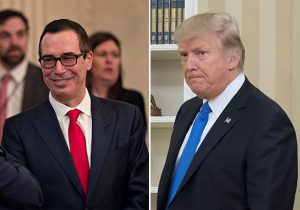From the New York website: Continuing his flurry of executive actions since taking office, President Donald Trump is expected to sign an order sharply limiting the Dodd-Frank Act rules today.
In addition to scaling back the regulatory system, which was put in place in 2010, Trump will also put an end to the so-called fiduciary rule, which requires advisers on retirement accounts to act in the best interest of their clients.
Trump is expected to sign the two directives following a meeting with corporate execs, including Blackstone Group’s CEO Steve Schwarzman, Bloomberg reported. The two actions reflect President Trump’s strategy for loosening regulation in the financial markets.
The administration’s deregulation could unleash Wall Street growth, as The Real Deal reported in its cover story this month.
A White House official said the administration believes some of the rules under Dodd-Frank are unconstitutional. As for the fiduciary rule, the president’s team thinks it is flawed and restricts options for consumers.
Earlier this week, Trump said Dodd-Frank was a “disaster,” and had damaged the country’s “entrepreneurial spirit.” Speaking to small business owners, he pledged to do a “big number” on the regulations.
Bloomberg reported that Trump’s team will pay particular attention to the Volcker rule in the Dodd-Frank Act, which prohibits banks that accept consumer deposits from trading on their own accounts.
As TRD reported in late November, the Volcker rule hasn’t prevented banks from lending on real estate projects. A repeal of Dodd-Frank could have a much greater impact on the residential market, removing possible safeguards against reckless and predatory lending. Trump could also roll back risk retention rules that require CMBS issuers to keep 5 percent of loans on their books. The rules took effect in December.
Democrats are expected to push back against the deregulation, and Alan Greenspan, the former Federal Reserve chair, said recently that he doesn’t think Trump can dismantle Dodd-Frank in its entirety, even if he tries. “The complexity of unwinding such regulation embedded in the system makes it nearly impossible,” he said. [Bloomberg] – E.B. Solomont
